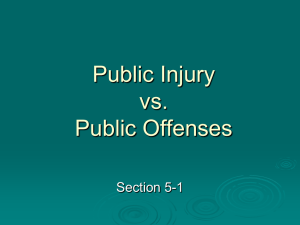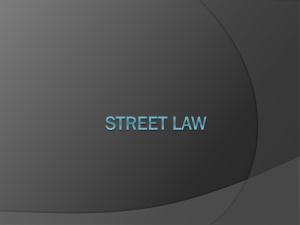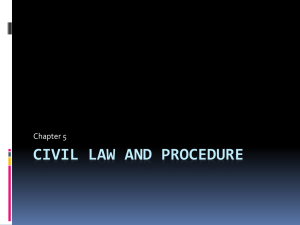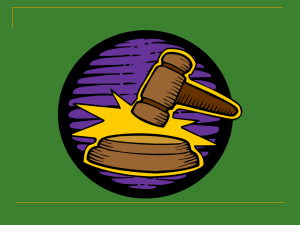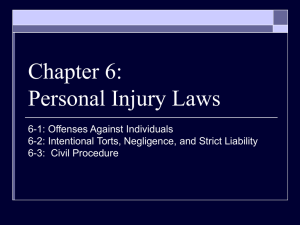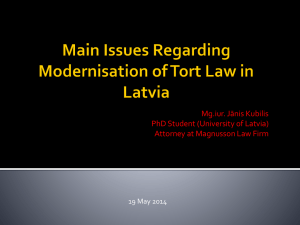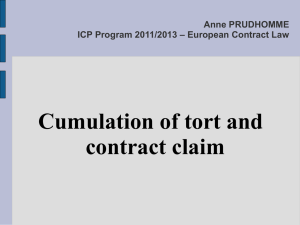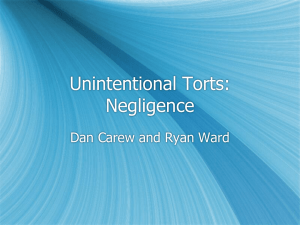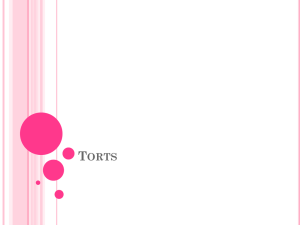Practical Tips - Association of Corporate Counsel
advertisement
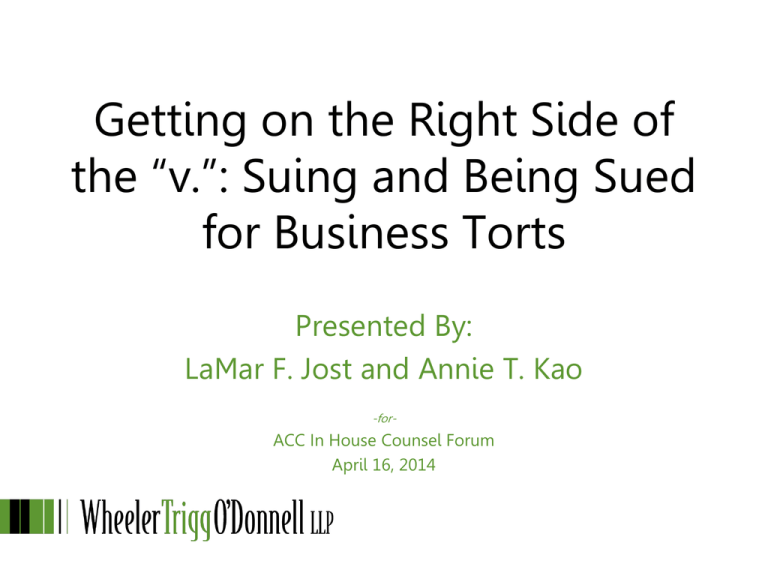
Getting on the Right Side of the “v.”: Suing and Being Sued for Business Torts Presented By: LaMar F. Jost and Annie T. Kao -for- ACC In House Counsel Forum April 16, 2014 LaMar F. Jost Partner at Wheeler Trigg O’Donnell, practicing primarily in medical malpractice, product liability, and commercial litigation. Prior to joining WTO, was Law Clerk to The Honorable Bobby R. Baldock, United States Court of Appeals for the Tenth Circuit, and to The Honorable Clarence A. Brimmer, United States District Court for the District of Wyoming. Contact: jost@wtotrial.com Annie T. Kao Joined Vail Resorts in 2010 as Litigation Counsel, where she manages and litigates a variety of commercial disputes for the Mountain, Hospitality, and Real Estate divisions. Prior to joining Vail Resorts, was a trial attorney at the law firms of Hogan Lovells, LLP and Brownstein Hyatt Farber Schreck, LLP. Clerked for the Honorable Mary J. Mullarkey, former Chief Justice of the Colorado Supreme Court in 2002. Contact: akao@vailresorts.com Overview Overview Business tort lawsuits are becoming increasingly prevalent as parties and lawyers look for ways to avoid contractual limitations on damages. Tort claims are being used as a "sword" in commercial disputes to circumvent armslength contractual agreements. Overview This session will provide an overview of legal theories and defenses to help your company understand when filing a tort claim is appropriate; and If necessary, the means to defend a business tort claim. Introduction to Business Torts Introduction What Are Business Torts? A tort is a wrongful injury to a person or property. A business tort is a wrongful injury to a business or its property; as one commentator described it, a business tort is “a private wrongdoing in the course of business.” Business torts are based in common and statutory law. Introduction A host of different business torts exist. They include: Tortious interference with a contract; Bad faith in business contracts; Interference with prospective advantage; Unfair competition/ misappropriation; Breach of fiduciary duties; Fraudulent/negligent misrepresentation; Business defamation; Unfair competition; Antitrust; Misappropriation of trade secrets; Civil conspiracy/RICO; Breach of covenants not to compete; Internet and software piracy; and Patent or trademark infringement. Introduction Damages and Other Remedies: Business tort claims expose a defendant-business to liability for damages its conduct proximately caused. Although business torts frequently originate with or involve a contract, tort damages are more expansive than contract damages. Compensatory damages include lost profits, loss of good will, and loss of investments. Punitive damages may also be available. Business torts oftentimes require injunctive or extraordinary relief (e.g., a temporary or permanent restraining order to enforce a covenant not to compete). Practical Tips Protect the company on the front end: Regularly review and update form contracts; To the extent permissible under law, include waivers of tort-based remedies in commercial contracts; If reputation/publicity matters, consider arbitration clauses. If the company is sued, consider moving to dismiss tort-based claims early in the lawsuit. Protect your company’s “litigation reputation.” Avoid negotiating “defense costs” in settlement. The Boundary Between Tort and Contract The Boundary Between Contract and Tort Much business-to-business litigation involves a contract between two commercial entities. Courts have struggled to draw the line between contract and tort law. Economic Loss Rule & Independent Duty of Care The economic loss rule generally bars recovery in tort for injuries other than those sustained by a person or other property.1 The purpose of the economic loss rule is to maintain a line between tort and contract.2 The Colorado Supreme Court adopted the economic loss rule: “[A] party suffering only economic loss from the breach of an express or implied contractual duty may not assert a tort claim for such a breach absent an independent duty of care under tort law”. Economic Loss Rule & Independent Duty of Care A tort claim cannot be maintained where a “duty of care is created by, and completely contained in, the contract[.]” In one case, the Colorado Supreme Court reversed a $600,000 judgment for negligence against the defendant where the jury found that a contract existed but was not breached.1 Is economic loss an affirmative defense? Exceptions to Economic Loss Rule Duty in Tort The economic loss rule does not apply where there is an independent duty in tort; in other words, if the tort claim arises from a duty extraneous to the contract, then a tort claim for economic loss may proceed.1 Generally, such duties arise from “duties imposed by law to protect citizens from risk of physical harm or damage to their personal property.”2 Exceptions to Economic Loss Rule Duty in Tort The Colorado Supreme Court has been reluctant to find a duty in tort between commercially sophisticated parties.1 A court will analyze the following factors to determine if a tort duty exists: The relief sought: is the relief sought in negligence the same as the contractual relief? The common law: is there a recognized common law duty of care? The duties involved: does the negligence duty differ in any way from the contractual duty?2 Businesses Susceptible to Tort-Based Claims Professional services – the company may be sued for breach of contract or breach of fiduciary duty. Specialty or “niche” industries (e.g., software industry, firearms industry) – these types of companies are often sued in contract and tort because of valuable and “secret” information (e.g., theft of trade secrets). Insurance industry – insurance companies are often sued for breach of contract and in tort (i.e., “bad faith”). Exceptions to Economic Loss Rule Breach of the Implied Duty of Good Faith and Fair Dealing Sometimes called “Bad Faith in Business Contracts.” In general, this claim does not exist in tort.1 “Every contract in Colorado contains an implied duty of good faith and fair dealing . . . . In most contractual relationships, a breach of this duty will only result in damages for breach of contract and will not give rise to tort liability.” For example, the Colorado Supreme Court has rejected implying this duty to at-will employment contracts.2 The “exception to the exception”: the implied duty of good faith and fair dealing gives rise to an independent tort duty in insurance contracts.3 Exceptions to Economic Loss Rule Economic Loss Doctrine Construction Defect Litigation “[S]ubcontractors owe homeowners a duty of care, independent of any contractual obligations to act without negligence in the construction of a home.”1 Practical Tips Enhance the Sophistication of the Other Contracting Parties. Paper your suggestion that they use legal counsel. Allow sufficient time for them to review the contract. Traps of “Discretion” in a Contract: A Contract is an instruction manual. Are you sure you want or need open, discretionary terms? Train your business clients to exercise contractual power wisely and understand the risks The Key Business Torts Intentional Interference with Contractual Relations “One who intentionally and improperly interferes with the performance of a contract (except a contract to marry) between another and a third person[.]”1 Tortfeasor must induce or otherwise cause the third person not to perform the contract. This tort is meant to punish the conduct of a third person who is not a party to the contract.2 A party to a contract cannot be held liable for intentional interference with that contract. Interference with Prospective Business Advantage This tort is similar to tortious interference with a contract, but focused on intentional interference with formation of a contract or quasi-contract. A tortfeasor is liable if he/she/it intentionally and improperly interferes with another’s prospective contractual relation (except a contract to marry) if the interference consists of: Inducing or otherwise causing a third person not to enter into or continue the prospective relation; or Preventing the other from acquiring or continuing the prospective relation.1 Interference with Prospective Business Advantage Factors to consider in determining if the defendant is intentionally interfering include: The nature of the actor’s conduct; The actor’s motive; The interests of the other with which the actor’s conduct interferes; The interests sought to be advanced by the actor; The social interests in protecting the freedom of action of the actor and the contractual interests of the other; The proximity or remoteness of the actor’s conduct to the interference; and The relations between the parties.1 Civil Conspiracy A plaintiff must present evidence of an agreement to form a conspiracy because a court will not imply a conspiracy.1 The purpose of the conspiracy must involve an unlawful act or unlawful means.2 Negligent Misrepresentation Defendant gave false information to plaintiff; Defendant gave such information to plaintiff in the course of Defendant’s business; Defendant gave information to plaintiff for his/her guidance or use in a business transaction; Defendant was negligent in obtaining or communicating the information; Defendant gave the information with the intent of knowing that plaintiff would act (or fail to act) in reliance on the information; Plaintiff relied on the information supplied by defendant; and Plaintiff suffered damages by relying on the information the defendant supplied.1 Breach of Fiduciary Duty The existence of a fiduciary duty; Knowing participation in the breach; and Damages.1 Breach of Fiduciary Duty Relationships Giving Rise to Fiduciary Duties Attorney to client;1 Brokerage firm or broker to customer;2 Director of corporation to the corporation/ shareholders;3 Members of a limited liability company to the company;4 Director of an insolvent corporation to the corporation’s creditors (limited fiduciary duty);5 A general partner to a limited partner in a partnership;6 An episcopal diocese and bishop have a fiduciary duty to a parishioner.7 Misappropriation of Trade Secrets/ Unfair Competition - Elements To prove misappropriation of a trade secret, a plaintiff must show: That he or she possessed a valid trade secret; That the trade secret was disclosed or used without consent; and The defendant knew, or should have known, that the trade secret was acquired by improper means.1 Practical Tips Fact-Intensive Torts: Negligent Misrepresentation Inducing a Contract Build a strong relationship with your Marketing Department Know your in-house contract negotiators Breach of Fiduciary Duty Don’t get closer than arms length Act for the benefit of your own company first Conclusion Conclusion Most business torts originate in contract. Businesses and lawyers have to be aware and on top of the ever-changing law on Colorado’s economic loss rule. Business tort cases are becoming increasingly prevalent as parties and lawyers look for ways to avoid contractual limitations on damages. A business tort case is oftentimes a search for extra-contractual damages. Conclusion Additional Resources: Litigating Business and Commercial Tort Cases by Matthew A. Cartwright, Kirk Reasonover, and Joseph Peiffer (2013). This is the best treatise on the market on business torts; it is comprehensive and geared toward the practicing lawyer; it has a lot of forms for discovery and trial preparation. Andrew R. Klien, Comparative Fault and Fraud, 48 Ariz. L. Rev. 983 (2006). Interesting and thoughtful discussion on whether comparative fault principles should apply in a fraud action. The “Business Torts Reporter” – short publication service dedicated solely to issues that arise in business torts.
